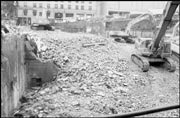THERE’S A HUGE, gaping hole in the ground where the downtown library used to be. Construction crews are finishing demolition in order to begin construction of a new $159 million Central Library. Meanwhile, just down the street, the Seattle City Council just last week passed an austerity budget that cuts most city departments by 4 percent, slashes or freezes 70 city jobs, and closes libraries citywide for two weeks next year. Does Seattle really need a new Central Library when the economy is in the tank?
Maybe not, but it’s getting one anyway. Despite the recession, the City Council left the funding for new parks, libraries, community centers, and Seattle Center renovations untouched. Seattle Center will get, among other things, a new Flag Pavilion and a spiffy Opera House renovation.
Is this wise? Ask the voters. Most of the city’s capital improvements—from new parks to new community centers to the new downtown and neighborhood libraries—were passed by the voters over the last three years.
Those initiatives called for property-tax levies to pay for the new programs. So the city couldn’t use that money to fill other budget gaps in its general fund, even if it wanted to.
“For voted levy projects, there was no consideration for slowing those down,” says Joan Walters, the city’s budget director.
Mayor Paul Schell believes having so many capital improvement programs in place is just what the local economy needs right now. Since January, the region has been hit with a triple whammy of bad economic news: the collapse of the tech industry, the downturn caused by the Sept. 11 terrorist attacks, and the passage of I-747.
“It was,” says Schell, “the perfect storm.”
Walters says the time is right for the city to build things like new libraries, parks, and community centers. Putting them off, she says, would only make the projects more expensive in the long run.
“By delaying them, it gives no money to the general fund,” she says. “You’d be paying more in many cases if you delayed.”
Another reason to move forward with the city’s capital projects is that they could provide a much-needed boost to Seattle’s flagging economy. Building new libraries and parks means more construction, and that means more jobs.
“The city is probably contributing somewhat to the economic development of the region right now, where other aspects of the economy are faltering,” says Walters.
Steve Williamson, executive secretary for the King County Labor Council, says the creation of construction jobs will provide a boost to the rest of the economy. When people are working, he reasons, they spend money, and that keeps other people employed.
“The fact that these workers will be earning paychecks will create spin-off jobs,” he says.
Other people point out, though, that many of these capital improvement programs owe their existence to the tremendous boom the area experienced in the last decade. Sheila Stickel served as campaign manager for Neighbors For Seattle Parks, the group that worked for passage of the parks levy in 2000. She says the initiative may have passed just in time.
“I think the parks levy benefited from a good economy,” she says. In six or seven years, Stickel says, another parks levy may not pass.
Alan Deright, who fought against the library initiative in 1998, agrees. His group, No on Seattle Proposition 1, tried to argue that the cost of the library program would be greater than its supporters said it would. They did not, however, have the foresight to predict that the economy would go into a nosedive.
The library initiative passed with over 60 percent of the vote—no one, says Deright, likes to vote against schools and libraries—but he wonders if it would have as much success in a recession.
“Maybe those levies that got 60 percent wouldn’t pass today,” he says.
Schell says it’s lucky for Seattle that they did. In hard times, the city needs to find ways to prop up the economy.
“When you’re trying to bring the economy back, when the private sector is cutting jobs, the public sector needs to play an active role in creating jobs,” says Schell.
Labor’s Williamson concedes, however, that the city’s capital projects won’t be the magic cure-all for Seattle’s economy. A laid-off dot-com programmer will not suddenly find work just because there’s more construction work.
“I don’t know that those construction jobs are going to offset job losses elsewhere,” said Williamson.
Deright is even more skeptical about the city’s chances of boosting the economy. Three years after the library levy passed, he says he’s not convinced that the additional taxes the city is receiving do much good.
Whether or not the number of jobs created through the city’s ambitious building plans helps drag Seattle out of the recession remains to be seen. But think of the irony if the lingering effects from the euphoria of the New Economy helped bring Seattle out of the collapse of the New Economy.






